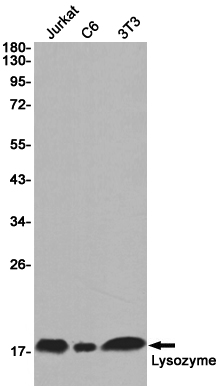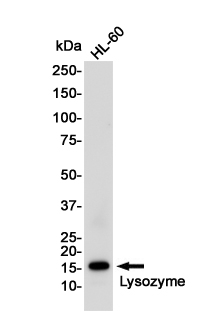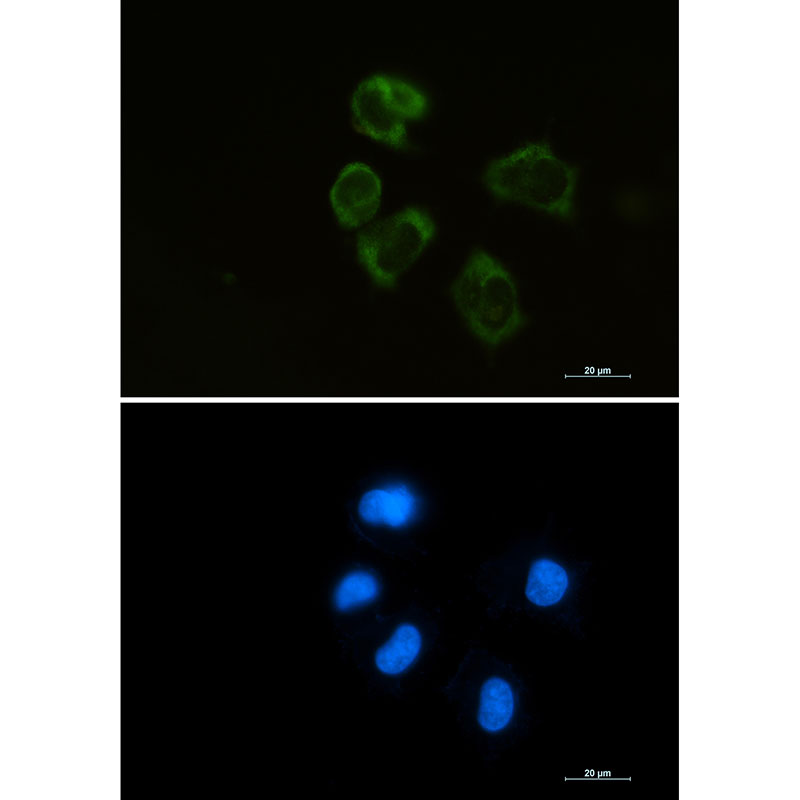


| WB | 1/500-1/1000 | Human,Mouse,Rat |
| IF | 1/20 | Human,Mouse,Rat |
| IHC | 咨询技术 | Human,Mouse,Rat |
| ICC | 1/50-1/200 | Human,Mouse,Rat |
| FCM | 咨询技术 | Human,Mouse,Rat |
| Elisa | 咨询技术 | Human,Mouse,Rat |
| Aliases | LZM; LYZF1 |
| Entrez GeneID | 4069 |
| WB Predicted band size | Calculated MW: 17 kDa; Observed MW: 17 kDa |
| Host/Isotype | Rabbit IgG |
| Antibody Type | Primary antibody |
| Storage | Store at 4°C short term. Aliquot and store at -20°C long term. Avoid freeze/thaw cycles. |
| Species Reactivity | Human,Mouse,Rat |
| Immunogen | A synthetic peptide of human Lysozyme |
| Formulation | Purified antibody in TBS with 0.05% sodium azide,0.05%BSA and 50% glycerol. |
+ +
以下是关于溶菌酶(Lysozyme)抗体的3篇参考文献及其摘要概要:
1. **文献名称**:*Monoclonal antibodies against hen egg-white lysozyme: a tool to study antigenic specificity*
**作者**:Fischetti, V.A., et al.
**摘要**:该研究报道了针对鸡卵清溶菌酶的单克隆抗体制备,通过杂交瘤技术筛选出高特异性抗体,并分析其与溶菌酶不同表位的结合能力,为抗原-抗体相互作用机制提供了实验依据。
2. **文献名称**:*Therapeutic scFv antibodies against lysozyme amyloid fibrils prevent cytotoxicity in vitro*
**作者**:Hammarström, P., et al.
**摘要**:作者开发了单链抗体片段(scFv),靶向溶菌酶淀粉样纤维,实验证明其能抑制纤维形成并减少细胞毒性,为溶菌酶相关淀粉样变性疾病提供了潜在治疗策略。
3. **文献名称**:*Cross-reactive anti-lysozyme antibodies in influenza H1N1 immunity*
**作者**:Deroo, T., et al.
**摘要**:研究发现部分流感H1N1康复者体内存在与溶菌酶交叉反应的抗体,提示溶菌酶可能作为某些病原体的模拟抗原表位,对疫苗设计中的免疫交叉反应研究具有启示意义。
以上文献涵盖抗体开发、疾病治疗及免疫交叉性研究,均聚焦于溶菌酶抗体的功能与应用。如需具体发表年份或期刊,建议通过PubMed或Google Scholar进一步检索。
Lysozyme antibodies are immunoglobulins specifically designed to recognize and bind to lysozyme, a conserved enzyme with antimicrobial properties. Lysozyme (muramidase) is a small, cationic protein found in diverse biological fluids, including tears, saliva, and egg whites, where it hydrolyzes bacterial cell wall peptidoglycans, playing a key role in innate immunity. Due to its abundance and stability, lysozyme is widely studied in biochemistry, immunology, and structural biology, making antibodies against it valuable research tools.
These antibodies are typically generated in laboratory animals (e.g., rabbits, mice) using purified lysozyme as an immunogen. Both polyclonal and monoclonal variants exist, offering flexibility in applications. Polyclonal antibodies detect multiple epitopes, enhancing sensitivity in assays like Western blotting or immunohistochemistry, while monoclonal antibodies target specific epitopes, ensuring high specificity for quantitative techniques like ELISA. Lysozyme antibodies are critical for studying protein expression, localization, and function in immune responses, as well as in quality control for food industries (e.g., detecting lysozyme as a preservative in dairy products).
Clinically, anti-lysozyme antibodies aid in diagnosing lysozyme-related disorders, such as hereditary lysozyme deficiencies or monitoring lysozyme levels in leukemia. Their cross-reactivity across species (e.g., human, chicken) further broadens their utility in comparative studies. Overall, lysozyme antibodies serve as indispensable reagents bridging basic research, industrial applications, and diagnostic medicine.
×